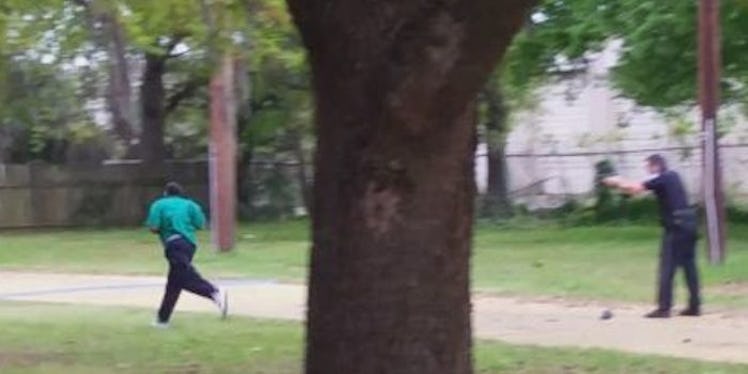
This Tweet Perfectly Explains Why All Cops Should Wear Body Cameras
On Saturday, a white police officer in South Carolina, Michael T. Slager, shot and killed an unarmed black man, Walter Scott. The incident began with a routine traffic stop but ended with eight shots being fired into Scott's body.
Initially, Slager claimed he opened fire because he felt his life was in danger. He also contended that Scott had attempted to obtain his stun gun.
But on Tuesday, a graphic video of the incident, filmed by a passerby, revealed a starkly different story.
In the footage, Scott can be seen fleeing from Slager as the officer pulls out his gun and begins to fire. What's more, it appears Slager may have planted a weapon on Scott after he shot him.
Consequently, Slager has been charged with murder. But there's no doubt this would've never occurred without the video.
This one tweet sums it all up:
I can tell you 25 stories off the top of my head that are just like #WalterScott. It's just that this one was filmed. — Shaun King (@ShaunKing) April 8, 2015
In less than 140 characters, this individual makes a good argument for the opinion that police should be on camera all of the time.
This all comes in the midst of an ongoing debate surrounding police brutality and racism. Concurrently, there have been widespread calls for police to utilize body cameras.
Some communities have already instituted such policies, and they've had great results.
All of the evidence points to the fact that body cameras help reduce violence and complaints against police, as noted by The Guardian. When both police and the individuals they're interacting with know they're on camera, there's no room for misconduct.
Interestingly enough, prior to this shooting, South Carolina police officials rejected proposals for police body cameras. But after this incident, the mayor of North Charleston not only fired Officer Slager but also announced all police officers in the community will now wear body cameras.
Police have an incredibly difficult job. No reasonable person will deny that fact. They place themselves in danger every single day for the sake of our protection.
But none of this means they are infallible or above criticism. When police make mistakes or do something blatantly illegal and immoral, they should be held accountable. No one is above the law.
Yet, when cops use lethal force in the line of duty, the law tends to give them the benefit of the doubt, even if the circumstances are suspect.
Simply put, if a police officer kills someone, he or she is rarely charged with a crime. Citizens, however, are almost always indicted in similar situations.
Police are allowed to commit what is known as justifiable homicide under two circumstances: to protect themselves or other innocent bystanders or if the source of the threat is a suspected violent felon.
But if there isn't anyone there to witness the use of such force, police can alter the narrative of what occurred. In other words, if they killed someone by accident, or unnecessarily, and no one saw, they could argue that they felt threatened and it was justified.
Unfortunately, we just witnessed this exact scenario in North Charleston. It's further proof body cameras are a reasonable approach to protecting both the public and police.
We can't always rely on brave bystanders to be there to film police encounters, and body cameras are an extremely viable solution.
Citations: California police use of body cameras cuts violence and complaints (The Guardian), Michael Slager fired from South Carolina police force after killing of Walter Scott (The Guardian), South Carolina police came out against a body camera bill (Fusion ), Why police body cameras would work (CNN)